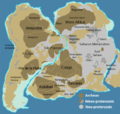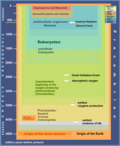Earth's crustal evolution involves the formation, destruction and renewal of the rocky outer shell at that planet's surface. The variation in composition...
24 KB (2,920 words) - 03:08, 31 May 2025
Earth's crust is its thick outer shell of rock, referring to less than one percent of the planet's radius and volume. It is the top component of the lithosphere...
13 KB (1,646 words) - 16:59, 4 March 2025
The geological history of Earth follows the major geological events in Earth's past based on the geologic time scale, a system of chronological measurement...
56 KB (6,509 words) - 20:12, 4 June 2025
zones. Many theories of crustal growth are controversial, including rates of crustal growth and recycling, whether the lower crust is recycled differently...
17 KB (2,000 words) - 16:26, 1 June 2025
Almost all of Earth's water is contained in its global ocean, covering 70.8% of Earth's crust. The remaining 29.2% of Earth's crust is land, most of...
219 KB (19,425 words) - 21:33, 29 May 2025
Earth and Planetary Science Letters. 233 (3–4): 337–349. doi:10.1016/j.epsl.2005.02.005. Condie, K.C. 1997. Plate Tectonics and Crustal Evolution (4th...
15 KB (1,856 words) - 22:08, 23 May 2025
which generates Earth's magnetic field. Despite its geological significance, Earth's interior heat contributes only 0.03% of Earth's total energy budget...
18 KB (2,119 words) - 05:38, 14 January 2025
Plate tectonics (redirect from Crustal plate)
result in plates and shape Earth's crust are called tectonics. Tectonic plates also occur in other planets and moons. Earth's lithosphere, the rigid outer...
115 KB (14,377 words) - 04:55, 1 June 2025
understanding of the main events of Earth's past, characterized by constant geological change and biological evolution. The geological time scale (GTS),...
143 KB (15,589 words) - 19:10, 23 May 2025
clouds and hazes), all retained by Earth's gravity. The atmosphere serves as a protective buffer between the Earth's surface and outer space, shields the...
64 KB (6,466 words) - 00:23, 29 May 2025
History of life (redirect from History of evolution)
they named this part of Earth's history the Hadean. However, analysis of zircons formed 4.4 Ga indicates that Earth's crust solidified about 100 million...
231 KB (22,688 words) - 16:20, 22 May 2025
67% of the mass of Earth. It has a thickness of 2,900 kilometers (1,800 mi) making up about 46% of Earth's radius and 84% of Earth's volume. It is predominantly...
28 KB (3,248 words) - 14:53, 24 May 2025
Mohorovičić discontinuity (category Earth's crust)
near the Earth's surface and the other refracted by a high-velocity medium. The Moho marks the transition in composition between the Earth's crust and the...
15 KB (1,709 words) - 16:27, 28 April 2025
Mozambique Belt (category Earth's crust)
The Mozambique Belt is a band in the Earth's crust that extends from East Antarctica through East Africa up to the Arabian-Nubian Shield. It formed as...
4 KB (481 words) - 14:14, 17 October 2023
Sima (geology) (category Earth's crust)
sima (/ˈsaɪmə/) is an antiquated blended term for the lower layer of Earth's crust. This layer is made of rocks rich in magnesium silicate minerals. Typically...
3 KB (361 words) - 20:56, 23 September 2024
is difficult to study: none of Earth's primary crust has survived to today. Earth's high rates of erosion and crustal recycling from plate tectonics has...
11 KB (1,379 words) - 13:46, 2 April 2025
Earth's magnetic field, also known as the geomagnetic field, is the magnetic field that extends from Earth's interior out into space, where it interacts...
79 KB (8,967 words) - 05:17, 3 June 2025
20% of Earth's radius or 70% of the Moon's radius. There are no samples of the core accessible for direct measurement, as there are for Earth's mantle...
61 KB (7,216 words) - 03:45, 5 June 2025
Lithosphere (redirect from Earth's lithosphere)
thousands of years or more. The crust and upper mantle are distinguished on the basis of chemistry and mineralogy. Earth's lithosphere, which constitutes...
16 KB (1,895 words) - 23:39, 5 May 2025
Brittle–ductile transition zone (category Earth's crust)
zone") is the zone of the Earth's crust that marks the transition from the upper, more brittle crust to the lower, more ductile crust. For quartz and feldspar-rich...
6 KB (651 words) - 19:29, 26 May 2025
Orogeny (redirect from Crustal deformation)
of repeated cycles of deposition, deformation, crustal thickening and mountain building, and crustal thinning to form new depositional basins. These...
40 KB (4,457 words) - 15:19, 26 April 2025
Great Oxidation Event (redirect from Oxygenation of the Earth)
or Oxygen Holocaust, was a time interval during the Earth's Paleoproterozoic era when the Earth's atmosphere and shallow seas first experienced a rise...
87 KB (9,611 words) - 12:01, 22 May 2025
mantle, as well as crustal material with an isotopic signature different from that of primitive mantle. Identification of this crustal signature in mantle-derived...
16 KB (1,753 words) - 18:02, 27 April 2024
majority of Earth's surface is covered by oceans, those oceans make up just a small fraction of the mass of the planet. The mass of Earth's oceans is estimated...
46 KB (5,517 words) - 01:06, 17 May 2025
Hadean (redirect from Cool early Earth)
concerning water on early Earth Formation and evolution of the Solar System Hadean zircon – Oldest-surviving crustal material from the Earth's earliest geological...
33 KB (3,481 words) - 16:01, 23 May 2025
Gaia hypothesis (category Evolution of the biosphere)
to the pressure exerted on the Earth’s crust, and released during periods of ice sheet retreat. Breaking out of the Earth from the frozen condition appears...
77 KB (9,256 words) - 03:31, 2 June 2025
Tectonic uplift (section Crustal thickening)
tectonic processes of crustal thickening (such as mountain building events), changes in the density distribution of the crust and underlying mantle,...
12 KB (1,690 words) - 16:11, 17 May 2025
Post-glacial rebound (redirect from Crustal rebound)
measurable effects on vertical crustal motion, global sea levels, horizontal crustal motion, gravity field, Earth's rotation, crustal stress, and earthquakes...
46 KB (5,644 words) - 21:31, 25 May 2025
Continent (redirect from Earth's continents)
surrounding ocean crust. Geology – The landmass should contain different types of rock: igneous, metamorphic, and sedimentary. Crustal structure – The landmass...
90 KB (8,844 words) - 00:33, 26 May 2025
because the magma assimilates some of the crustal rock through which it ascends (country rock), and crustal rock tends to be high in silica. Silica content...
31 KB (3,326 words) - 00:33, 8 June 2025
























